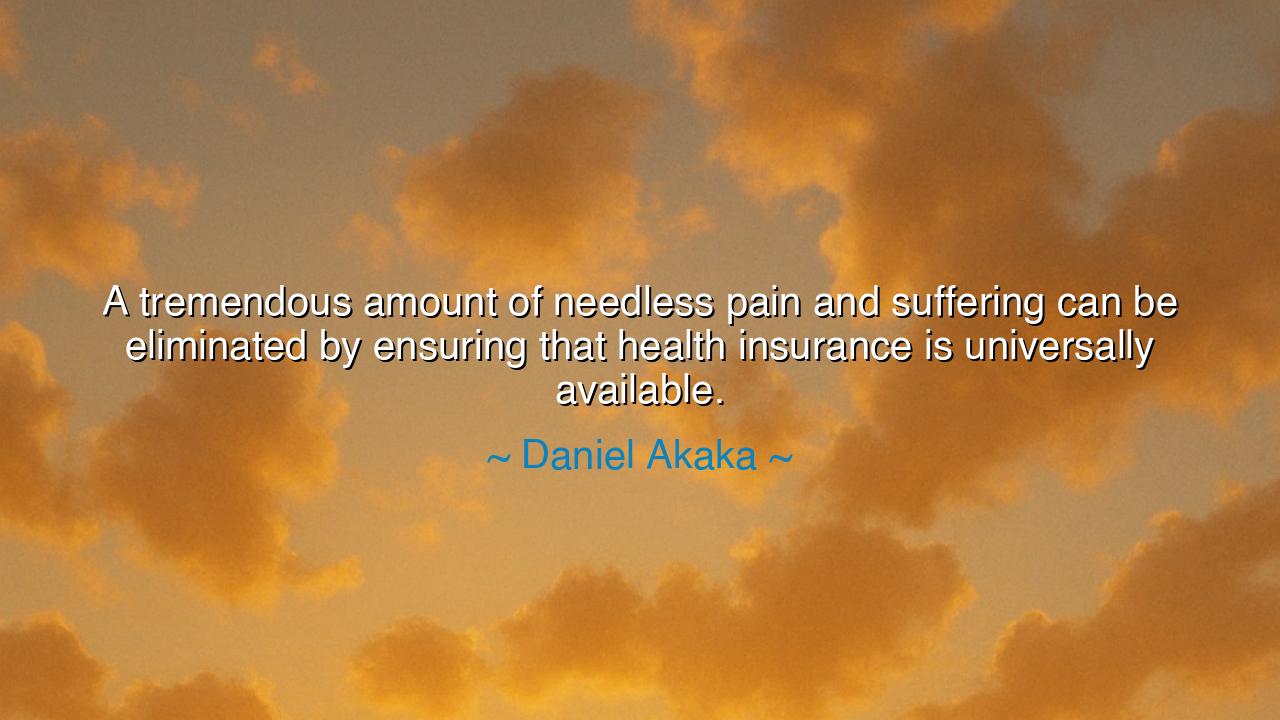
A tremendous amount of needless pain and suffering can be
A tremendous amount of needless pain and suffering can be eliminated by ensuring that health insurance is universally available.






“A tremendous amount of needless pain and suffering can be eliminated by ensuring that health insurance is universally available.” — Daniel Akaka
Hear, O seeker of justice and compassion, the words of Daniel Akaka, a man of peace, humility, and service, whose heart beat for the well-being of all. In this saying, he speaks of a truth that reaches beyond policy and into the soul of civilization — that much of the world’s pain and suffering is not born of fate, but of neglect. The sickness of the poor, the despair of the uninsured, the silent deaths in the shadows of hospitals — these are not the judgments of heaven, but the failures of humankind. Akaka’s call for universal health insurance is not merely political; it is moral, a plea that every life deserves the protection of care, that no human being should fall into ruin for lack of healing.
The origin of his words lies in his lifelong service as a U.S. Senator from Hawaii, a land where the values of community and mutual care are woven deeply into the culture. Akaka believed in the ancient Hawaiian principle of “aloha”, which means more than love — it means respect, compassion, and shared responsibility. In his eyes, health care was a manifestation of aloha itself: a society’s promise to its people that no one would be abandoned in their hour of need. He had seen too often the burden carried by families crushed under medical debt, the agony of those who delayed treatment because they could not pay, and the grief of lives lost to preventable illness. Thus, his message became a torch — that universal health insurance is not charity, but justice.
To understand the depth of Akaka’s wisdom, we must look upon history’s lessons. Consider the story of postwar Japan, where after great devastation, the leaders of a broken nation resolved to build anew — not only their cities, but their people. They established a universal health care system, ensuring that every citizen, rich or poor, could receive care without fear. In the decades that followed, Japan rose not only in power, but in vitality, boasting one of the highest life expectancies in the world. Their healing was not accidental; it was built upon compassion structured into policy. In contrast, nations that deny such security often see their people grow sick, their children weaker, their communities poorer in both body and spirit. Akaka’s words echo through these examples: when care is universal, life flourishes; when it is withheld, suffering multiplies.
Akaka’s teaching is both gentle and fierce. He does not cry out for pity, but for responsibility. He reminds us that suffering born of neglect is the most shameful kind, for it can be prevented. He calls upon leaders to see beyond profit and pride, to view health not as a marketplace, but as a sacred trust between government and people. And he calls upon individuals — each of us — to recognize that our neighbors’ well-being is tied to our own. For when one suffers without care, the entire community is weakened. Disease spreads where compassion fails, and despair festers where empathy is absent. The health of a nation is not measured in wealth, but in how it treats its most vulnerable.
Consider, too, the tale of Florence Nightingale, the Lady with the Lamp, who walked among the dying soldiers of the Crimean War. She saw men dying not from wounds alone, but from infection and neglect — from systems that valued power more than people. Her tireless efforts to reform hospital care transformed the world’s understanding of medicine. Nightingale, like Akaka, understood that suffering is often preventable, that organization and compassion combined can turn chaos into healing. From her torch and Akaka’s words burns the same flame: the belief that humanity’s highest duty is to alleviate pain where it can be lessened.
The lesson of Daniel Akaka’s wisdom is this: health is not the privilege of the few, but the right of all. When a society ensures that every person has access to care, it creates not only physical well-being but social peace. Fear recedes, hope grows, and communities strengthen. To withhold such protection is to accept unnecessary sorrow; to grant it is to affirm life itself. Each of us, in our homes and workplaces, can honor this truth — by supporting systems that promote equity, by aiding those in need, by remembering that compassion is the first medicine.
Therefore, O listener, let these words take root in your heart: “A tremendous amount of needless pain and suffering can be eliminated.” The path is clear — through empathy made practical, through justice made policy, through love made law. Build a world where no one fears to fall ill, where every hand that trembles finds another reaching to help. For when healing is shared, the spirit of a nation is renewed; and when every heart is cared for, humanity at last becomes whole.






AAdministratorAdministrator
Welcome, honored guests. Please leave a comment, we will respond soon